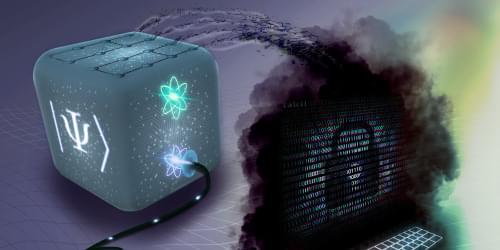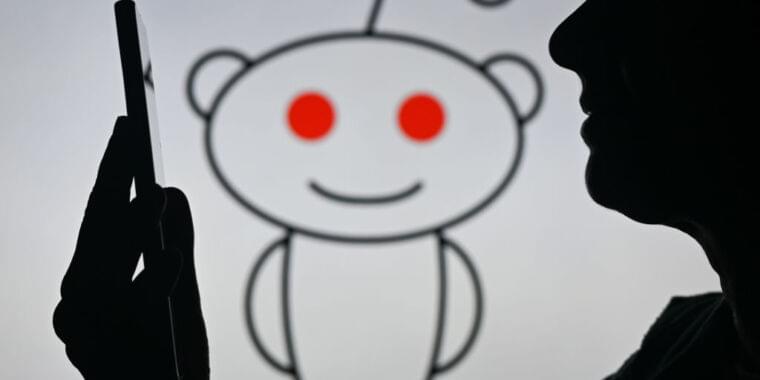The Futurists Podcast — Robert Tercek & Brett King.
Category: business – Page 41
Elizabeth Reynolds, Managing Director, US, Starburst Aerospace; Championing An Aerospace Renaissance
Championing an aerospace renaissance — elizabeth reynolds, managing director, US, starburst aerospace.
Elizabeth Reynolds is Managing Director, US of Starburst Aerospace (https://starburst.aero/), a global Aerospace and Defense (A\&D) startup accelerator and strategic advisory practice championing today’s aerospace renaissance, aligning early-stage technology innovators with government and commercial stakeholders and investors to modernize infrastructure in space, transportation, communications, and intelligence.
Elizabeth’s team works alongside hundreds of technology startups developing new aircraft, spacecraft, satellites, drones, sensors, autonomy, robotics, and much more.
Elizabeth brings 15 years of experience in deep tech entrepreneurship, growth, business operations, and strategy to the team. Prior to joining Starburst, she served as an executive for biotech, medtech, mobility, and interactive media companies, from founding through IPO. She is also an advisor to a number of startups and nonprofits supporting STEM education.
Starburst has offices in Los Angeles, Washington, D.C., Paris, Munich, Singapore, Seoul, Tel Aviv, and Madrid, has grown into a global team of 70 dedicated team members with a portfolio of 140+ startups, 20 accelerator programs, and 2 active venture funds which strive to provide enabling growth services for deep tech leaders disrupting the industry and working towards a safer, greener, and more connected world.
What If We Accessed The 10th Dimension?
This video explores the 4th to the 10th dimensions of time. Watch this next video about the 10 stages of AI: • The 10 Stages of Artificial Intelligence.
🎁 5 Free ChatGPT Prompts To Become a Superhuman: https://bit.ly/3Oka9FM
🤖 AI for Business Leaders (Udacity Program): https://bit.ly/3Qjxkmu.
☕ My Patreon: / futurebusinesstech.
➡️ Official Discord Server: / discord.
💡 Future Business Tech explores the future of technology and the world.
Examples of topics I cover include:
• Artificial Intelligence \& Robotics.
• Virtual and Augmented Reality.
• Brain-Computer Interfaces.
• Transhumanism.
• Genetic Engineering.
SUBSCRIBE: https://bit.ly/3geLDGO
Disclaimer:
Some links in this description are affiliate links.
As an Amazon Associate, I earn from qualifying purchases.
This video explores the 4th to the 10th dimensions of time. Other related terms: advanced civilization, ai, artificial intelligence, future business tech, future technology, future tech, future business technologies, future technologies, aliens, higher dimensions, 10th dimension, 4th dimension, 5th dimension, 6th dimension, 7th dimension, 8th dimension, 9th dimension, time travel, etc.

Cloud Computing under the Cover of Quantum
A secure method for cloud-based quantum computing harnesses the power of quantum physics to keep data confidential.
Progress in quantum technology has been swift, but we still are far from the day when everyone will have a quantum computer in their house or at their business. The early stages of quantum computing will likely rely on a quantum version of the “cloud,” where users send data and computing tasks to a state-of-the-art quantum machine hosted by Google, IBM, or another company. But is that approach secure? It can be, thanks to the impenetrable secrecy of quantum-based protocols. A recent experiment demonstrates a version of “blind quantum computing” using trapped ions [1]. The protocol is scalable, meaning it offers potential to be incorporated into larger and larger quantum computing systems.
Quantum computers have the potential to be game changers in computationally intensive tasks such as drug discovery and material design. In these highly competitive sectors, there would be concerns about using a cloud-based quantum computer. “A company searching for a new wonder drug or for a high-performance battery material wouldn’t want to reveal confidential secrets,” explains Peter Drmota of the University of Oxford. However, it has been shown—in theory—that one can perform computations on a remote quantum computer while hiding the data and the operations done on such data. “Blind quantum computing could give a client confidence to use whoever’s quantum computer,” Drmota says.

The Artificial Intelligence Era Faces a Threat from Directed Energy Weapons
Autonomous and AI-enabled systems increasingly rely on optical and radio frequency sensors and significant computer power. They face growing vulnerabilities from directed-energy laser and microwave weapons.
In May the U.S. secretary of the Air Force flew in an F-16 that engaged in a mock dogfight over the California desert while controlled by artificial intelligence. Carmakers from San Francisco to Boston are jousting to deliver driverless cars. In Norway a crewless cargo ship carries fertilizer from port to port. On the land, sea and in the air, we face the coming of such autonomous platforms—some envisioned to benefit humanity, and others meant for destruction—available to everyone, to governments, businesses and criminals.

Dr Roland Roesch — Director, Innovation and Technology Centre, International Renewable Energy Agency
Innovation For A Sustainable Global Energy Transformation — Dr. Roland Roesch, Ph.D. — Director, Innovation and Technology Centre, International Renewable Energy Agency (IRENA)
Dr. Roland Roesch, Ph.D. is Director, Innovation and Technology Centre (IITC), of the International Renewable Energy Agency (IRENA — https://www.irena.org/) where he oversees the Agency’s work on advising member countries in the area of technology status and roadmaps, energy planning, cost and markets and innovation policy frameworks.
The International Renewable Energy Agency (IRENA) is a leading global intergovernmental agency for energy transformation that serves as the principal platform for international cooperation, supports countries in their energy transitions, and provides state of the art data and analyses on technology, innovation, policy, finance and investment. IRENA drives the widespread adoption and sustainable use of all forms of renewable energy, including bioenergy, geothermal, hydropower, ocean, solar and wind energy in the pursuit of sustainable development, energy access, and energy security, for economic and social resilience and prosperity and a climate-proof future.
Dr. Roesch currently leads IRENA´s work on RE Innovation, Grids-Assessments and the Strategies Teams for the Power Sector Transformation and for the Gas Sector Transformation. He actively leads the development of IRENA´s work in the fields of ocean energy, blue economy and decarbonizing the shipping sector.
Before becoming Director, Dr. Roesch served as IITC Deputy Director from 2018.

Decoding the business of brain–computer interfaces
Here’s a nice article discussing the progress of the brain-computer interface industry, some existing startups in the space, and where the industry may go in the future.
Fifty years after the term brain–computer interface was coined, the neurotechnology is being pursued by an array of start-up companies using a variety of different technologies. But the path to clinical and commercial success remains uncertain.

3 Companies Already Working on the Next Phase of Artificial Intelligence (AI)
These businesses are building tech that could exceed the abilities of today’s AI.
The field of artificial intelligence is still in its early years, yet several businesses are already working on technology that can become the foundation for AI’s future. These companies are developing quantum computing systems capable of processing mountains of data in seconds, which would take decades for a conventional computer.
Quantum machines can execute multiple computations simultaneously, accelerating processing time, while typical computers must process data in a linear fashion. This means quantum systems can evolve AI beyond the abilities of the most powerful supercomputers, enabling AI to drive cars and help find cures to diseases.

OpenAI will use Reddit posts to train ChatGPT under new deal
Earlier this month, Reddit published a Public Content Policy stating: Unfortunately, we see more and more commercial entities using unauthorized access or misusing authorized access to collect public data in bulk, including Reddit public content. Worse, these entities perceive they have no limitation on their usage of that data, and they do so with no regard for user rights or privacy, ignoring reasonable legal, safety, and user removal requests.
In its blog post on Thursday, Reddit said that deals like OpenAI’s are part of an open Internet. It added that part of being open means Reddit content needs to be accessible to those fostering human learning and researching ways to build community, belonging, and empowerment online.
Reddit has been vocal about its interest in pursuing data licensing deals as a core part of its business. Its building of AI partnerships sparks discourse around the use of user-generated content to fuel AI models without users being compensated and some potentially not considering that their social media posts would be used this way. OpenAI and Stack Overflow faced pushback earlier this month when integrating Stack Overflow content with ChatGPT. Some of Stack Overflow’s user community responded by sabotaging their own posts.